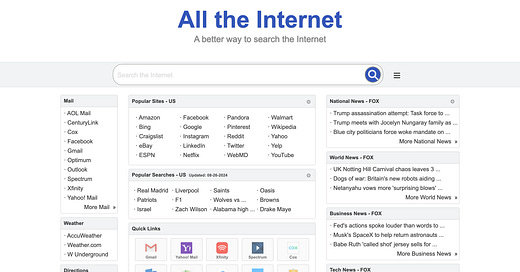Tool Spotlight: Using a meta-search engine as a fishing net 🎣
Introducing Our New Series: Spotlighting Top Tools for Paid Subscribers
Getting the job done effectively requires a trusty set of tools. In our Tool Spotlight series, we unlatch our trusty toolbox and show you what’s inside. Here’s a guide on how to use meta-search engines.
What is it?
As the name suggests, meta-search engines are... Search engines! So they work kind of like a traditional search engine: you type something in the search bar, your query is then scanned and compared to the search engine's database of indexed web pages, which outputs the closest match to what you typed (based on specific instructions but we will not get too technical here, you can check out the "Going further" section for more details).
Unlike traditional search engines, meta-search engines query multiple search engines at the same time, and present the compiled results to the user. Think of it like a fishing net. While you can absolutely fish with a rod, the results will be limited by the characteristics of your rod. This is exactly like search engines, which are limited by the rules that their indexation system follows. However, if you use a fishing net, you'll gather much more fish that you would with a rod. That is, because your scope is wider. Meta-Search engines are like fishing nets: to mitigate the variation in results caused by the different databases, you get results from multiple search engines, and compile them to provide a readable version to the user.
Why use them?
The internet is vast with billions of web pages created and updated every day. While search engines are designed to help us navigate this ocean of information, each one has its own way of doing things. Some might prioritize certain types of content, while others may miss out on key information entirely due to the way they index and rank websites. Relying on just one search engine during an Open-Source investigation means that you might miss out on tons of valuable pieces of information, which is detrimental to the success and credibility of your results.
For example, Google wants each user to see the most relevant content based on their location. Therefore, if you are investigating something that happened in Italy but you live in the U.S., you will have a hard time finding any results if you only rely on Google.
Although you can definitely tweak the Google parameters to show results as if you were in Italy, meta-search engines are an efficient tool to broaden the search scope. As they pull in results from multiple search engines, they give you a more comprehensive view of what's available online. In one query, you can fetch results from Google, Bing, DuckDuckGo, Qwant, etc. Isn't that amazing?
Keep reading with a 7-day free trial
Subscribe to The Weekly OSINT Newsletter to keep reading this post and get 7 days of free access to the full post archives.





